人教版五年级英语下册unit1Myday
人教PEP版英语五年级下册Unit 1 My day Part A课件

Exercises
一、为下列短语选择正确的汉语翻译。 A.返回学校 B.在家 C.在西班牙 D.午饭后
( B ) 1. at home ( C ) 3. in Spain
( D ) 2. after lunch ( A ) 4. go back to school
Exercises
二、情景交际小能手。
Let's talk
知识点 3
usually
通常地;惯常地
用法:表示做事的频率,在句中放在实义动词的前面, 系动词和助动词之后,也可以放在句首。
选出错误的一项,并改正。
( B ) What do you do usually on the weekend?
A
B
C
__u_s_u_a_ll_y__d_o__
Let's talk
知识点 4
when 与 what time
when 和 what time都可以用来询问时间,意思是“什么时候”, 它们之间的区别如下:
当询问做某事的具体时间(几 --When / What time do you have dinner?
点钟)时,两者可以替换
--I have dinner at 6:00 p.m.
p.m.
Can you say
A: When do you _________________? B: At ___________.
ABCD EFGH
a.m.
Can you say
A: When do you _________________? B: At ___________.
p.m.
Let's talk When do you…?
人教PEP版2020年五年级英语下册Unit1Myday(第4课时)教案
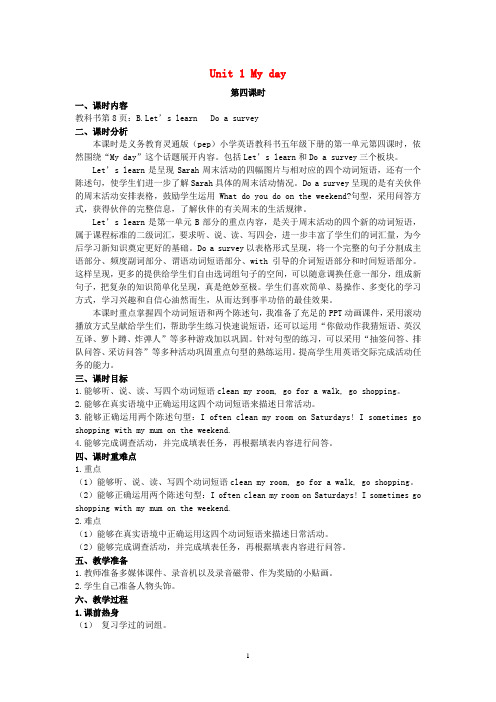
Unit 1 My day第四课时一、课时内容教科书第8页:B.Let’s learn Do a survey二、课时分析本课时是义务教育灵通版(pep)小学英语教科书五年级下册的第一单元第四课时,依然围绕“My day”这个话题展开内容。
包括Let’s learn和Do a survey三个板块。
Let’s learn是呈现Sarah周末活动的四幅图片与相对应的四个动词短语,还有一个陈述句,使学生们进一步了解Sarah具体的周末活动情况。
Do a survey呈现的是有关伙伴的周末活动安排表格,鼓励学生运用What do you do on the weekend?句型,采用问答方式,获得伙伴的完整信息,了解伙伴的有关周末的生活规律。
Let’s learn是第一单元B部分的重点内容,是关于周末活动的四个新的动词短语,属于课程标准的二级词汇,要求听、说、读、写四会,进一步丰富了学生们的词汇量,为今后学习新知识奠定更好的基础。
Do a survey以表格形式呈现,将一个完整的句子分割成主语部分、频度副词部分、谓语动词短语部分、with引导的介词短语部分和时间短语部分。
这样呈现,更多的提供给学生们自由选词组句子的空间,可以随意调换任意一部分,组成新句子,把复杂的知识简单化呈现,真是绝妙至极。
学生们喜欢简单、易操作、多变化的学习方式,学习兴趣和自信心油然而生,从而达到事半功倍的最佳效果。
本课时重点掌握四个动词短语和两个陈述句,我准备了充足的PPT动画课件,采用滚动播放方式呈献给学生们,帮助学生练习快速说短语,还可以运用“你做动作我猜短语、英汉互译、萝卜蹲、炸弹人”等多种游戏加以巩固。
针对句型的练习,可以采用“抽签问答、排队问答、采访问答”等多种活动巩固重点句型的熟练运用。
提高学生用英语交际完成活动任务的能力。
三、课时目标1.能够听、说、读、写四个动词短语clean my room, go for a walk, go shopping。
(完整版)人教版五年级英语下册Unit1知识点汇总

Unit1 My day 知识整理△话题:谈论每天的活动及时间安排△词汇:do morning exercises(做早操)eat breakfast/lunch/dinner(吃早餐/午餐/晚餐)have...class(上…课),play sports(做运动)clean my room(打扫我的房间),go for a walk (散步) go shopping(购物),take a dancing class(上舞蹈课)△拓展词汇:get up(起床), go to bed(上床睡觉)wash my clothes(洗我的衣服), watch TV(看电视)do homework(做作业), play music(演奏音乐)cook dinner(煮晚餐), at home(在家)in the morning(在上午),in the afternoon(在下午)in the evening(在晚上),at night(在半夜)△句型:①询问做某事在几点When do you+动词原形(短语)+其他?—— At +时间—— I(+频度副词)+动词原形(短语)+at+时间。
例句:When do you get up in the morning?—— At 7:30.—— I often get up at 7:30.②询问周末的活动安排What do you often do on the weekend?I often (always/sometime/usually) +…(周末的活动)+with … (某人)+on the weekend (on Saturdays/on Sundays ).例句:What do you do on the weekend ?I often take a dancing class with my friend on Sundays. △知识点:1:注意介词的搭配at +具体时间(几点)/night/home at 9 o ’clock in +国家/季节 in Spainon +星期 on the weekend/on Sundays with +人 with my father/mother/friend 2:表示时间频率词的区别always 表示总是,一直;usually 表示经常,通常;often 表示经常,常常;sometimes 表示有时,间或。
2024年人教版小学英语五年级下册unit1 My day—课件

go to bed: ______
What do you do at the weekend?
I usually play football.
What do you do at the weekend,?
I ususally play football.
What do you do on the weekend?
watch TV go swimming ride bikes I usually_____________.
go fishing
sleep
read books
What do you often do on the weekend?
Clean my room
Go for a walk
Go shopping Take a dancing class
A. What
B. Who
C. When
4.( )I____ watch TV on Sunday.
A. am
B. do
C. usually
5.( )I go to work at 6:00____ the morning .
A. on
B. in
C. at
都二
能分
运浇
用灌
好,
“八
二分
八等
定待
律;
选择题
1.( )When do you do morning ____ ?
A. exercise B. exercises C. exercising
2.( )I usually do homework _____ 6:00.
A. on
B. in
C. at
3.( )____ do you play sports ?
人教PEP版五年级英语下册 Unit 1 My day 知识点清单

Unit 1 My day一、核心词汇1.动词: take 学习;上(课)2.名词: dancing跳舞;舞蹈exercise活动;运动3.短语: do morning exercises做早操eat breakfast吃早饭play sports进行体育运动eat dinner吃晚饭go for a walk散步go shopping去买东西;购物clean my room 打扫我的房间take a dancing class 上舞蹈课have … class 上……课二、了解词汇1.动词: start开始shop去买东西;购物work工作need需要live居住win获胜sound听起来好像2.名词: Spain西班牙play戏剧;剧本letter信island岛cave山洞;洞穴3.介词: after在(时间)后4.其他: when什么时候;何时late晚;迟 a.m.午前;上午p.m.午后;下午why为什么last上一个的;刚过去的also还;也busy 忙的5.拓展词汇——频率副词(1)定义: always, usually, sometimes等词叫作频率副词,用来表示动作发生的频率,但程度上有区别。
按频率大小可做如下排列: always > usually > sometimes(2)位置:频率副词一般放在主语之后、实义动词之前。
I always get up at 6:30. 我总是六点半起床。
I usually watch TV on the weekend. 我周末通常看电视。
(usually也可用于句首)I sometimes visit my grandparents. 有时我看望我的祖父母。
(sometimes也可以放在句首)6.短语:watch TV看电视eat lunch吃午饭go to bed上床睡觉go swimming去游泳 go home回家go to school去上学三、核心句型1.— When do you do morning exercises? 你什么时候做早操?— At 7 o’clock. 七点。
人教PEP版英语五年级下册Unit1《MyDay》全单元课时说课稿
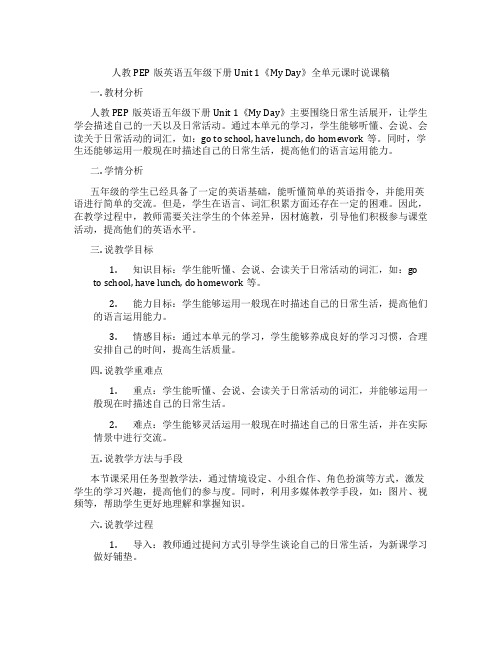
人教PEP版英语五年级下册Unit 1《My Day》全单元课时说课稿一. 教材分析人教PEP版英语五年级下册Unit 1《My Day》主要围绕日常生活展开,让学生学会描述自己的一天以及日常活动。
通过本单元的学习,学生能够听懂、会说、会读关于日常活动的词汇,如:go to school, have lunch, do homework等。
同时,学生还能够运用一般现在时描述自己的日常生活,提高他们的语言运用能力。
二. 学情分析五年级的学生已经具备了一定的英语基础,能听懂简单的英语指令,并能用英语进行简单的交流。
但是,学生在语言、词汇积累方面还存在一定的困难。
因此,在教学过程中,教师需要关注学生的个体差异,因材施教,引导他们积极参与课堂活动,提高他们的英语水平。
三. 说教学目标1.知识目标:学生能听懂、会说、会读关于日常活动的词汇,如:goto school, have lunch, do homework等。
2.能力目标:学生能够运用一般现在时描述自己的日常生活,提高他们的语言运用能力。
3.情感目标:通过本单元的学习,学生能够养成良好的学习习惯,合理安排自己的时间,提高生活质量。
四. 说教学重难点1.重点:学生能听懂、会说、会读关于日常活动的词汇,并能够运用一般现在时描述自己的日常生活。
2.难点:学生能够灵活运用一般现在时描述自己的日常生活,并在实际情景中进行交流。
五. 说教学方法与手段本节课采用任务型教学法,通过情境设定、小组合作、角色扮演等方式,激发学生的学习兴趣,提高他们的参与度。
同时,利用多媒体教学手段,如:图片、视频等,帮助学生更好地理解和掌握知识。
六. 说教学过程1.导入:教师通过提问方式引导学生谈论自己的日常生活,为新课学习做好铺垫。
2.呈现:教师展示教材图片,引导学生说出日常活动词汇,如:go toschool, have lunch, do homework等。
3.学习:教师带领学生学习一般现在时的表达方式,如:I go to schoolevery day.4.实践:学生分组进行角色扮演,运用一般现在时描述自己的日常生活。
人教版PEP英语五年级下册Unit1-My-Day知识点归纳与练习(含答案)
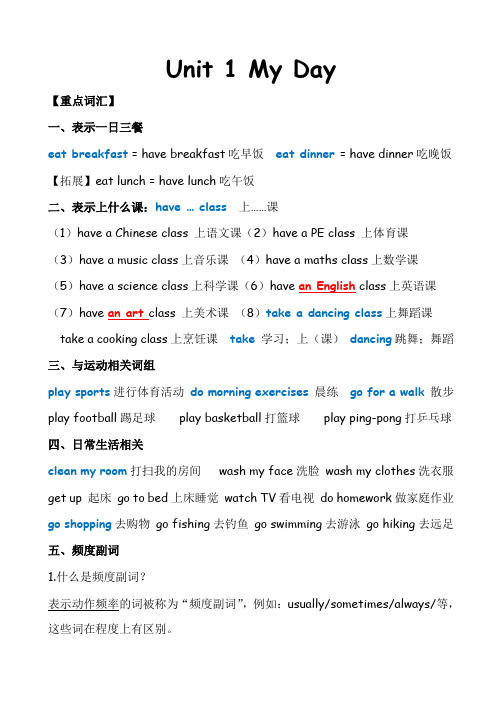
Unit 1 My Day【重点词汇】一、表示一日三餐eat breakfast = have breakfast吃早饭eat dinner= have dinner吃晚饭【拓展】eat lunch = have lunch吃午饭二、表示上什么课:have … class 上……课(1)have a Chinese class 上语文课(2)have a PE class 上体育课(3)have a music class上音乐课(4)have a maths class上数学课(5)have a science class上科学课(6)have an English class上英语课(7)have an art class 上美术课(8)take a dancing class上舞蹈课take a cooking class上烹饪课take学习;上(课)dancing跳舞;舞蹈三、与运动相关词组play sports进行体育活动do morning exercises晨练go for a walk散步play football踢足球play basketball打篮球play ping-pong打乒乓球四、日常生活相关clean my room打扫我的房间wash my face洗脸wash my clothes洗衣服get up 起床go to bed上床睡觉watch TV看电视do homework做家庭作业go shopping去购物go fishing去钓鱼go swimming去游泳go hiking去远足五、频度副词1.什么是频度副词?表示动作频率的词被称为“频度副词”,例如:usually/sometimes/always/等,这些词在程度上有区别。
2.常见频度副词按频率大小排列如下:always(100%)>usually(80%)>often(60%)>sometimes(20%~40%)> never (0%)3.注意频度副词的使用位置:①We usually go to school at seven in the morning.②What do you often do on the weekend?六、常见时间的表达方式1.at + 具体的几点钟;at noon在中午;at night在晚上2.in +月份/季节/早中晚例如:in the morning/afternoon/evening3.关于on表示时间的几种情况:①on + 星期几;②on + 几月几日;③on the weekend在周末;④on Monday morning星期一早上。
五年级下册英语素材-Unit 1 My day 知识详解 人教PEP

Unit 1 My day知识详解A Let’s talk 知识详解重难点1. 询问对方的作息时间的句型——When do you …?课文应用:When do you finish class in the morning? 你们上午的课什么时候结束?We finish class at 1 o’clock. 我们一点钟结束上午的课。
句型结构:问句:When do you + 动词原形+其他?答语:I / We + 动词(短语) 原形+ at + 时间.重点解析:此问句用于询问时间,属于wh问句(do型)。
其基本框架:疑问词+ 助动词+ 人/物+ 动词原形+ 其他?When do you finish class in the morning?when:引导特殊疑问句,用来询问时间。
do:助动词,没有实际意义,帮助构成疑问句。
答语中通常会使用频度副词,如often, usually, sometimes等。
生活实例:每个人的作息时间都有差异。
Dongdong想知道Jack什么时候做家庭作业:When do you do your homework in the evening? 你在晚上什么时候做你的家庭作业?I usually do my homework at 7:30. 我通常在七点三十分做我的家庭作业。
知识拓展:询问他人的作息时间的句型第三人称单数When does + 主语(第三人称单数) + 动词(短语) 原形+ 其他?例如:When does Tom go to bed? 汤姆什么时候上床睡觉?复数人称When do + 主语(复数人称) + 动词(短语) 原形+ 其他?例如:When do they do morning exercises? 他们什么时候做早操?询问作息时间的其他表达方式询问作息时间还可以用“What time do/does + 主语+ 动词(短语)原形+ 其他?”句型。
Unit1Myday(单元解读)五年级英语下册(人教PEP版)(1)

五下Unit 1 My day 单元解读一、单元信息二、教材分析本单元学习的主题是介绍日常作息和周末活动。
分为主情景图和ABC三个部分。
主情景图通过张鹏和来自西班牙的新朋友Pedro讨论他在西班牙的学习生活,Amy和Sarah 以及Zoom和Zip分别讨论各自周末活动的情景呈现本单元要学习的核心句型。
A部分Let's try:本部分为听力活动,与Let's talk板块的对话教学相关,为对话教学作铺垫。
本活动的目的是让学生对新句型在听觉上有所感知,并根据录音选出适当的图片。
Let's talk:本部分学习的核心句型是:When do you…?We…at…o'clock。
教材通过张鹏询问新朋友Pedro在西班牙的学习与生活作息情况使学生感知上述句型的语义及语用情景。
Roleplay:这是一个角色扮演的活动。
这个活动与生活紧密相连,使学生关注职业的名称以及各个职业特定的作息时间。
本活动一般以两人一组形式进行,一人问一人回答,两人可互换角色,在问答的过程中选择不同的职业进行操练。
教师根据实际情况还可增加一些职业,如:teacher,worker等。
学生在角色扮演中进一步巩固A Let's talk板块中的核心句型以及使学生在职业与特定作息时间之间建立联系。
Let's learn:本部分学习的单词是:do moring exercise,eat breakfast,have…class,play sports,eat dinner。
教材通过张鹏和Pedro的问答以及Pedro的活动图片呈现了词组的词形和意义。
Ask and answer:本部分通过同桌两人问答活动了解同伴的作息时间,使学生将日常特定的活动与相应的时间联系在一起。
这个活动紧密结合学生个人实际情况,既能增强课堂趣味性,又能提高学生参与的积极性,在活动过程中进一步提高学生运用语言的能力,同时还训练了学生写的技能。
Let's spell:Let's spell分为Read, Listen and chant;Bingo以Choose,write and say三部分。
人教版五年级下册英语教案Unit-1--My-day

人教版五年级下册英语教案Unit-1--My-dayUnit 1 My day单元备课教材解读本单元是本册教材的第一单元。
从教材的整体来看,本单元讨论的话题是上学期内容的延伸和拓展。
本单元与五年级上册教材在知识编排上紧密衔接,起到了承上启下的作用。
从内容上主要是围绕“When do you ...?”这个话题展开的。
单元内容分为A、B、C三部分。
学生通过学习能够听懂、会说、会认读并拼写单词和短语:exercise,usually,often,sometimes,eat breakfast,do morning exercises,have English class,play sports,eat dinner,clean my room,wash my clothes,go shopping,on the weekend,on Sundays。
能够听、说、读、写句型:When do you ...? I usually ... at.... What do you do on the weekend?并能够在情境中运用。
能够按照正确的意群及语音、语调朗读对话并进行角色扮演。
单元C 部分是拓展了解部分,它以英文小故事的形式将A、B两部分的内容巧妙地联系起来,通过阅读使学生的英语素养在语言技能、语言知识、情感态度,学习策略和文化意识等方面得到整体发展和提升,提高学生的阅读能力,通过对故事情节中幽默环节的体会,感受语言文化的魅力。
单元目标一、知识与技能1.学生能够听、说、读、写五个有关日常作息活动的词组:do morning exercises,eat breakfast,have...class,play sports,eat dinner以及四个日常活动的词组:clean my room,go for a walk,go shopping,take a dancing class。
2.能够听、说、读、写句型:When do you get up? I often get up at 7 o’clock. What do you often do on the weekend? I often clean my room and wash my clothes. Sometimes I play ping-pong with Zhang Peng.3. 能够在情景中运用句型When do you …? I often…at… What do you often do on the weekend? I often…询问并回答某人的日常作息与周末安排。
Unit1Myday(讲义)-人教PEP版英语五年级下册

Unit 1 My day 讲义一.重点词汇1.四会单词eat breakfast /'brekfast/吃早饭clean my room打扫我的房间have...class上...课go for a walk散步play sports 进行体育运动go shopping 去买东西;购物exercise/"eksasaiz/活动;运动take/terk/学习;上(课)do morning exercises做早操dancing/'da:nsm/跳舞;舞蹈eat dinner 吃晚饭take a dancing class上舞蹈课2.三会单词when/wen/什么时候;何时sound/saund/听起来好像after/a:fta(r)/在(时间)后also/'o:lsau/还;也start/sta:t开始busy/ bizi/忙的usually/'ju:zual/通常地;惯常地need/ni:d需要Spain/spem西班牙play/pler/戏剧;剧本1ate/1ert/晚;迟letter/'leta(r)/信a.m./er 'em/午前;上午live/1rv/居住p.m/,pi: 'em/午后;下午island/'arlend/岛why/war为什么always/'o:lweiz/总是;一直shop购物cave/kerv/山洞;洞穴work/ws:k/工作win/wn获胜last/la:st/上一个的;刚过去的频率副词:always > usually> often>sometimes>never二、短语总结finish class 结束课程play sports 做运动go back to school去上学go to bed 上床睡觉go swimming 去游泳wash my clothes洗我的衣服get up 起床on the weekend 在周末eat lunch 吃午饭cook dinner做晚饭eat dinner 吃晚饭练一练一、选择题1.Why is your brother ________ today? ()A.shop B.shoping C.shopping 2.I sometimes go shopping with my mom on the _____________. () A.week B.morning C.weekend 3.I often go _________ on Sunday. ()A.shop B.shopping C.to shop 4._________ I play football on the weekend. ()A.Sometimes B.Some C.sometimes 5.—I often go swimming at Wenzhou Olympic Sports Center on Sundays. ()—_____.A.You’re helpful B.That sounds like a lot of fun C.That’s too late 二、填空题三、补全对话/短文Zhang Peng: When do you get up in Spain, Pedro?Pedro: 11 What about you?Zhang Peng: I often get up at 6:30. 12Pedro: I go to school at 8:30.Zhang Peng: I go to school at 7:30. 13Pedro: We start class at 9:00.Zhang Peng: We start class at 8:00. When do you eat lunch?Pedro: 14Zhang Peng: 15Pedro: I play sports at 4:30 p.m.Zhang Peng: Thank you.A.When do you start class?B.I eat lunch at 2:00 p.m.C.When do you play sports?D.I get up at 8:00.E.When do you go to school?四、句型转换16.I have a music class on Mondays. (改为否定句)17.There is some flowers on the desk. (改为一般疑问句)18.I often play football on Mondays. (对划线部分提问)19.I often play basketball on Saturdays. (否定句)20.John is from the USA. (划线提问)五、连词成句21.you, When, bed, to, do, go (?)22.on, the, weekend, what, do, you, do (?)23.Tuesday, let's, go, next, together, boating (.)24.often; a; class; Sunday; I; take; dancing; on(.)25.need help You robot a you to (.)六、阅读理解Hi, I’m John Smith. I am an English teacher. I am busy every day. I get up at 6:00 a.m. I walk to school. I eat breakfast at 7:30 at school. I start my work at 8:00. In the morning, I usually have three classes. I eat lunch at 12:00 in the classroom. After lunch, I read some books. In the afternoon, I have two classes. At 4:20, I play sports with my students. I like to play pingpong. I eat dinner at 5:30 p.m. at school. Then I read books in my office. I go home at 6:30 p.m. and I go to bed at 10:00 p.m. This is my day. I enjoy my life.26.What’s John Smith’s Job? ()A.He is a doctor.B.He is a cook.C.He is a teacher. 27.When does John Smith eat breakfast? ()A.At 6:00 a.m.B.At 7:30 a.m.C.At 8:00 a.m. 28.Where does John Smith have lunch? ()A.In the classroom.B.At home.C.In his office. 29.What sport does John Smith like to play? ()A.Basketball.B.Pingpong.C.Football. 30.How many classes does John Smith have a day? ()A.Two.B.Three.C.Five.。
最新人教版PEP小学英语五年级下册第一单元教案Unit1Myday

最新人教版PEP小学英语五年级下册第一单元教案Unit1Myday人教版小学英语五年级下册教学计划教材分析本册教材共6个单元、2个复习单元。
每个单元分“A、B、C”三个部分,共12页。
复习单元为6页。
A、B两部分主要教学单词和对话。
通过各种形式教学生字和单词,并培养学生的阅读能力;C部分作为扩展内容主要通过填色、画图、填充问卷以及手工制作等形式复习并适当扩展所学语言,通过听力活动,评价学生的学习效果。
一、学情分析五年级的学生已学过两年多的英语,学生以有一定的基础,良好的听、说、读、写英语的习惯已基本养成。
但由于教材难度偏大,教学内容与课时不成比例,学生的学习兴趣难以保持,两极分化较严重,口语能力较差。
因此,本学期应注重转化后进生,因材施教,分层教学,保持学生的学习兴趣,注意加强口语、阅读能力的训练。
三、教学目标1.养成良好的听英语、读英语、说英语的习惯。
2.初步养成良好的书写习惯。
3.能按三会与四会的要求掌握所学词语。
4.能四会要求掌握所学句型。
5.能运用所学的日常交际用语进行简单的日常交流,并做到大胆开口,积极参与,发音清楚,语调正确。
6.能在图片、手势、情景等非语言提示的帮助下,听懂简单的话语和录音材料。
7.能在任务型学习的过程中运用相关的语言知识和技能,完成某项任务。
8.能演唱已学的英语歌曲,能诵读已学过的英语歌谣。
四、教学重点难点1.重点:①四会句型、单词。
②在任务型学习的过程中运用相关的语言知识和技能,完成某项任务。
③运用所学的日常交际用语进行简单的日常交流,并做到大胆开口,积极参与,发音清楚,语调正确。
2.难点:养成良好的听英语、读英语、说英语的习惯。
五、主要措施1.根据学生的年龄特征,充分利用直观教具和电教手段,创设良好的语言氛围,调动学生的学习积极性。
2.在教学过程中,采用情景教学法,让学生身临其境,积极主动地参与到课堂教学中去,调动学生的非智力因素,提高学生实际运用语言的能力。
小学英语人教版五年级下册第一单元《Unit 1 My day》复习公开课教学设计(彩色版)
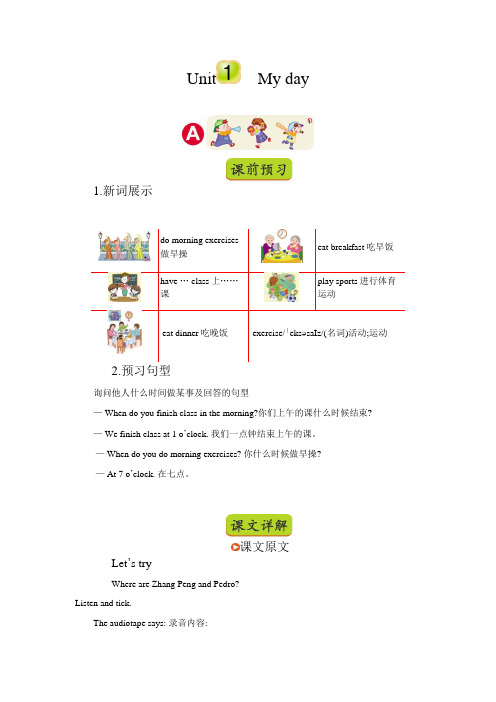
UnitMy day1.新词展示do morning exercises 做早操eat breakfasthave 课play sports 运动2.预习句型询问他人什么时间做某事及回答的句型— When do you finish class in the morning?你们上午的课什么时候结束? — We finish class at 1 o ’clock. 我们一点钟结束上午的课。
— When do you do morning exercises? 你什么时候做早操? — At 7 o ’clock. 在七点。
课文原文Let ’s tryWhere are Zhang Peng and Pedro? Listen and tick.The audiotape says: 录音内容:Pedro is a new student from Spain.Zhang Peng: Pedro, this is our new classroom. Do you like our school?Pedro: Yes, but I’m tired. In Spain, I always sleep a little in the afternoon.Zhang Peng: Really? When do you sleep?Pedro: At about 2 o’clock.Zhang Peng: Oh. That’s now, but we have a maths class at 2 o’clock.答案: 中间教室的图Let’s talkZhang Peng: When do you finish① classin the morning?Pedro: We finish class at 1 o’clock. Then we eat lunch② at home.Zhang Peng: Wow! When do you go back③ to school after④ lunch?Pedro: At 2:30. Classes start⑤ at 3o’clock.Zhang Peng: When do you usually eat dinner⑥ in Spain⑦?Pedro: Usually⑧ at 9:30 or 10 o’clock.Zhang Peng: Wow! That’s too late!Role-play.When do you get up?I get up at 5 o’clock.When do you go to bed⑨?At 6 o’clock in the morning. I work⑩at night.重点词汇详解①finish(动词)完成【对应词】 start 开始【例句】 I finish class at 4:00 in the afternoon. 我四点结束下午的课。
人教版小学英语五年级下册各单元知识点

人教版小学英语五年级下册各单元知识点Unit 1: My dayIn this unit, students learn to talk about their daily routines and the time in English. They also learn to express their likes and dislikes about different activities.Some of the key vocabulary words and phrases include:- Get up- Have breakfast- Go to school- Have lunch- Have dinner- Watch TV- Play games- Read books- Do homework- Brush teeth- Go to bedStudents are introduced to the verb "to be" and learn how to make simple sentences with it, such as "I am happy" or "He is tired". They also practice asking and answering questions using "what", "when", and "where".Unit 2: Colors and clothesIn this unit, students learn to identify and name colors, clothing items, and accessories in English. They also learn to describe their own clothing and what they are wearing.Some of the key vocabulary words and phrases include:- Red- Blue- Green- Yellow- Orange- Purple- Pink- White- Black- T-shirt- Dress- Pants- Skirt- Shoes- Socks- Hat- Bag- SunglassesStudents learn about the use of prepositions such as "on", "in", and "under" to describe clothing and daily routines. They also practice using adjectives to describe colors and clothing, and learn to ask and answer questions such as "What color is your shirt?" and "What are you wearing today?"Unit 3: Food and drinksIn this unit, students learn to talk about different types of food and drinks in English. They also learn about healthy eating habits and meal times.Some of the key vocabulary words and phrases include:- Pizza- Sandwich- Rice- Noodles- Salad- Fruit- Vegetables- Juice- Milk- Water- Breakfast- Lunch- Dinner- SnackStudents learn about the use of countable and uncountable nouns when talking about food and drinks. They also practice using the articles "a", "an", and "the" correctly. They learn to express likes and dislikes about different foods and drinks using the verb "to like" and "to dislike".Unit 4: Holidays and festivalsIn this unit, students learn about different holidays and festivals celebrated around the world. They learn to talk about the traditions, customs, and symbols associated with these celebrations.Some of the key vocabulary words and phrases include:- Christmas- Easter- Halloween- New Year- Valentine's Day- Thanksgiving- Dragon Boat Festival- Mid-Autumn Festival- Lantern Festival- Traditions- Customs- Symbols- FireworksStudents learn to ask and answer questions about holidays and festivals. They learn to use vocabulary related to greetings, gifts, and decorations. They also practice using the verb "to celebrate" to talk about different celebrations.Unit 5: Animals and petsIn this unit, students learn about different types of animals and pets. They learn to describe their appearance, behavior, and habitat. Some of the key vocabulary words and phrases include:- Dog- Cat- Fish- Bird- Rabbit- Hamster- Snake- Monkey- Elephant- Tiger- Giraffe- Zoo- Forest- Sea- SkyStudents learn to use adjectives to describe animals, such as "cute", "fierce", or "big". They practice asking and answering questions about pets and their owners, and learn about basic pet care and responsibilities.Unit 6: Weather and seasonsIn this unit, students learn to talk about different types of weather and the four seasons. They learn to express their preferences and activities associated with each season.Some of the key vocabulary words and phrases include:- Sunny- Cloudy- Rainy- Snowy- Windy- Spring- Summer- Fall/Autumn- Winter- Sun- Rain- Snow- Leaves- FlowersStudents learn to use verbs to describe weather and activities, such as "to swim" or "to play snowballs". They also practice using simple present tense to make statements and ask questions. They learn to use adjectives to describe weather, such as "beautiful", "hot", or "cold".Unit 1: My dayIn this unit, students will be introduced to the basic vocabulary and phrases related to their daily routines and the time.The teacher can start by asking students when they usually wake up, and elicit the verb "to get up". Then, the class can work on making sentences like "I get up at 7 o'clock in the morning" or "He gets up early". The teacher can also introduce basic adverbs of frequency, such as "always", "usually", "sometimes", and "never".The class can then move on to discussing meals, such as breakfast, lunch, and dinner. Students can practice using the verb "to have" to describe what they eat and drink, such as "I have cereal and milk for breakfast" or "She has a sandwich for lunch". They can also learn to talk about their favorite foods and drinks, and use expressions like "I like" or "I don't like".The teacher can also introduce basic verbs related to daily activities, such as "to go", "to come", "to watch", "to play", "to read", and "to do". Students can learn to make sentences like "I go to school by bus" or "He plays games after school". The teacher can also teach prepositions of place, such as "at", "in", and "on", todescribe daily routines in more detail.Finally, the class can practice telling time in English, using both the 12-hour and 24-hour clock formats. Students can work on making sentences such as "It's 7 o'clock" or "It's half past nine". Unit 2: Colors and clothesIn this unit, students will learn to identify and name different colors, clothing items, and accessories.The teacher can start by introducing basic colors, such as red, blue, green, yellow, and so on. Students can practice using colors to describe different objects, such as "a red car" or "a blue shirt". The class can also work on making sentences like "I like wearing green clothes" or "She has a pink bag".Next, the teacher can introduce different types of clothing, such as T-shirts, dresses, pants, skirts, shoes, socks, hats, and bags. The class can learn to use prepositions of place to describe clothing, such as "on", "in", or "under". For example, "I wear my T-shirt under my jacket" or "She puts her shoes in the closet".The class can also learn about different accessories, such as sunglasses, watches, and jewelry. Students can practice using vocabulary to describe accessories, and make sentences like "He wears a watch on his wrist" or "She likes wearing earrings". Finally, the teacher can introduce the concept of describing what someone is wearing. The class can practice using adjectives to describe clothing, such as "casual", "formal", or "fancy". They canalso practice asking and answering questions about each other's outfits, such as "What are you wearing today?" or "Do you like my shirt?"Unit 3: Food and drinksIn this unit, students will learn about different types of food and drinks, and healthy eating habits.The teacher can start by introducing basic food vocabulary, such as pizza, sandwich, noodles, salad, fruit, and vegetables. Students can practice using the verb "to have" to describe what they eat and drink, and learn to make sentences like "I have a banana for breakfast" or "She has a salad for lunch".The class can also learn about different types of drinks, such as juice, milk, and water. They can practice using vocabulary to describe drinks and make sentences like "He drinks orange juice in the morning" or "She likes drinking milk before bed".Next, the teacher can introduce vocabulary related to meal times, such as breakfast, lunch, dinner, and snack. The class can learn to use the correct articles "a", "an", and "the" when talking about food and drink, and practice making sentences like "I have an apple for a snack" or "We eat dinner at 6 o'clock".Finally, the class can learn about healthy eating habits, such as eating fruits and vegetables, and drinking enough water. They can practice expressing likes and dislikes about different foods and drinks using the verbs "to like" and "to dislike", and learn to make sentences like "I like apples but I dislike broccoli".Unit 4: Holidays and festivalsIn this unit, students will learn about different holidays and festivals celebrated around the world.The teacher can start by asking students if they celebrate any special holidays or festivals, and elicit different types of celebrations. Then, the class can learn about some of the most common holidays and festivals, such as Christmas, Easter, and Halloween, and discuss their traditions and customs.Next, the class can learn about different traditions and symbols associated with holidays and festivals from different cultures. For example, they can learn about the dragon boat festival in China, the mid-autumn festival in Vietnam, and the lantern festival in Japan.The teacher can also introduce vocabulary related to greetings, gifts, and decorations. Students can practice making sentences like "I gave my mom a card for Mother's Day" or "We decorate the Christmas tree with ornaments". The class can also practice using the verb "to celebrate" to talk about different celebrations.Finally, the class can learn about how holidays and festivals are celebrated in different countries and cultures. They can learn about different foods, costumes, and activities associated with each celebration.Unit 5: Animals and petsIn this unit, students will learn about different types of animals andpets.The teacher can start by asking students what animals they like or dislike, and elicit different types of animals. Then, the class can learn to identify and name different animals, such as dogs, cats, fish, birds, and so on.Next, the class can learn about different types of pets, such as dogs, cats, hamsters, and rabbits. They can practice using vocabulary to describe pets and make sentences like "I have a dog named Max" or "She likes to play with her cat".The teacher can also introduce vocabulary related to animal behavior, such as "cute", "fierce", or "friendly". The class can learn to use adjectives to describe animals, and practice making sentences like "The tiger is fierce but the bunny is cute".Finally, the class can learn about basic pet care and responsibilities. They can learn about feeding, grooming, and playing with pets, and practice making sentences like "I walk my dog every evening" or "She cleans her fish tank every week".Unit 6: Weather and seasonsIn this unit, students will learn to talk about different types of weather and the four seasons.The teacher can start by asking students what their favorite season is, and elicit different types of seasons. Then, the class can learn to identify and name different types of weather, such as sunny, cloudy, rainy, and snowy.Next, the class can learn about the different activities and events associated with each season. For example, they can learn about swimming and camping in the summer, apple picking and Halloween in the fall, skiing and ice skating in the winter, and gardening and Easter in the spring.The teacher can also introduce basic verbs related to weather and activities, such as "to swim", "to play", or "to ski". Students can practice making sentences like "I swim in the lake on hot days" or "She skis with her family in the winter".Finally, the class can learn to express their preferences and dislikes about each season, using expressions like "I love spring because of the flowers" or "I don't like winter because it's too cold". They can learn to use adjectives to describe weather, such as "beautiful", "hot", or "cold", and practice asking and answering questions using simple present tense.。
五年级英语下册教案-Unit 1 My day 人教PEP版
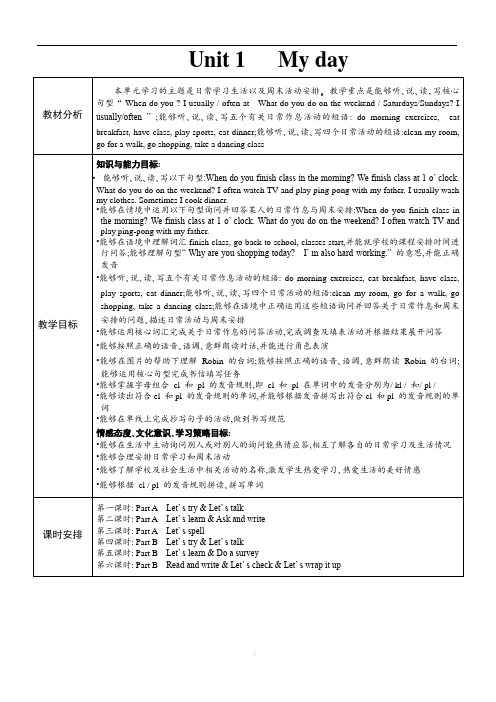
Unit 1 My day1The first period(第一课时)Part A Let’ s try & Let’ s talk▶Teaching Contents & Teaching AimsLet’s try•Listen to the dialogue and choose the right picture.Let’s talk•Understand the main idea of the dialogue by observing and talking about the pictures.•Read the dialogue and act out.•Use the sentence structures “When do you? I usually at” properly.▶Teaching Priorities•Understand the sample sentences. Try to imitate the sentence structures.▶Teaching Difficulties•Be able t o read the dialogue correctly and fluently.▶Teaching Procedures2The second period(第二课时)Part A Let’s learn & Ask and write ▶Teaching Contents & Teaching AimsLet’s learn3•Be able to listen, say, read and write the new phrases.•Be able to talk about the daily routine by using the key sentences.•Know that a healthy timetable is important to us.Ask and write•Be able to ask about the timetable of the partner.▶Teaching Priorities•Be able to listen, say, read and write the new phrases.▶Teaching Difficulties•Be able to use the key sentences in real situations.▶Teaching Procedures4The third period(第三课时)Part A Let’s spell▶Teaching Contents & Teaching AimsLet’s spell•Perceive and conclude the pronunciation rules of letter combinations “cl” and “pl” in words.•Read and write do wn the words that have the letter combination “cl” or “pl” according to the pronunciation rules.•Master the pronunciation of the words which have the letter combination “cl” or “pl”.•Know the fixed pronunciation of some letter combinations and improve st udents’ speech recognition ability and reading ability.▶Teaching Priorities5•Perceive and conclude the pronunciation rules of letter combinations “cl” and “pl” in words.▶Teaching Difficulties•Master the pronunciation of the words which have the letter combination “cl” or “pl”.▶Teaching Procedures6The fourth period(第四课时)Part B Let’s try & Let’s talk▶Teaching Contents & Teaching AimsLet’s try•Understand the dialogue and finish the listening exercise.Let’s talk•Understand the main idea of the dialogue by observing and talking about the pictures.•Read the dialogue and act out.•Use the sentence structures “What do you do on the weekend? I usually / often / sometimes” properly.▶Teaching Priorities•Understand the sample sentences. Try to imitate the sentence structures.▶Teaching Difficulties•Be able to read the dialogue correctly and fluently.▶Teaching Procedures78The fifth period(第五课时)Part B Let’ s learn & Do a survey▶Teaching Contents & Teaching AimsLet’ s learn•Be able to listen, say, read and write the new phrases.•Be able to talk about the daily activities by using the key sentences.•Be able to cultivate good living habits.Do a survey•Be able to do the survey with partners. Consolidate and use the key sentences and phrases. ▶Teaching Priorities•Be able to listen, say, read and write the new phrases.▶Teaching Difficulties•Be able to use the key phrases in daily communication.▶Teaching Procedures9The sixth period(第六课时)Part B Read and write & Let’ s check & Let’ s wrap it up ▶Teaching Contents & Teaching Aims10Read and write•Understand the main idea of the text. Know the words and the phrases: play, letter, island, early, cave, live on, get up, wash my face, eat breakfast, clean my cave, go swimming, play sports.•Finish the exercises about the text.•Read the text and act out.Let’s check•Be able to use the key words and sentences correctly.•Understand, write and use the phrases in real context.Let’s warp it up•Read and categorize the diverse phrases.▶Teaching Priorities•Be able to understand the main idea of the text in “Read and write”.▶Teaching Difficulties•Understand, read and role-play the text.•Imitate the sentences and write new ones.▶Teaching Procedures1112。
小学英语五年级下册《Unit1Myday》教学设计(人教PEP版)

小学英语五年级下册《Unit 1 My day》教学设计(人教PEP版)一、教学目标1. 知识与技能:(1)能够正确听、说、读、写本课的生词和重点句子。
(2)能够运用本课所学词汇和句型描述自己的日常生活。
(3)能够理解并运用一般现在时态描述日常活动。
2. 过程与方法:(1)通过图片、情景创设等方式,培养学生英语学习的兴趣。
(2)通过小组合作、角色扮演等活动,提高学生的英语口语表达能力。
(3)通过任务驱动法,培养学生自主学习和合作学习的能力。
3. 情感态度与价值观:(1)培养学生积极向上的生活态度,珍惜时间,热爱生活。
(2)培养学生乐于分享、善于合作的团队精神。
二、教学内容1. 词汇:morning, afternoon, evening, night, time, get up, have breakfast, go to school, have lunch, play, have dinner, go to bed等。
2. 句型:What time is it? It's o'clock. It's time for What do you do in the morning/afternoon/evening? I三、教学重点与难点1. 教学重点:(1)正确掌握本课的生词和重点句子。
(2)能够运用一般现在时态描述日常活动。
2. 教学难点:(1)词汇的读音和拼写。
(2)句型的正确运用。
四、教具与学具准备1. 教具:多媒体课件、图片、卡片、时钟模型等。
2. 学具:课本、练习册、笔、纸等。
五、教学过程1. 导入:通过唱英文歌曲《Hello, how are you?》来营造英语学习氛围,激发学生学习兴趣。
2. 新课展示:利用多媒体课件展示本课的生词和句型,引导学生跟读、模仿。
3. 情境创设:创设不同的生活场景,让学生运用本课所学词汇和句型进行口语练习。
4. 小组合作:将学生分成小组,进行角色扮演活动,提高学生的英语口语表达能力。
五年级下册英语Unit1 My day知识点总结复习及练习(含答案) 人教PEP

Unit1 My day知识速递1.重点单词和短语eat breakfast: 吃早饭have…class: 上……课play sports: 进行体育运动exercise: /'eksəsaɪz/ 活动;运动do morning exercise: 做早操eat dinner: 吃晚饭clean my room: 打扫我的房间go for a walk: 散步go shopping: 去买东西;购物take: /teɪk/ 学习;上(课)dancing: /'dɑːnsɪŋ/ 跳舞;舞蹈take a dancing class: 上舞蹈课when: /wen/ 什么时候;何时after: /'ɑːftə/ 在(时间)后start: /stɑːt/ 开始usually: /'juʒuəli/ 通常地;惯常地why: /waɪ/ 为什么always: /'ɔːlweɪz/ 总是;一直busy: /'bɪzɪ/ 忙的need: /niːd/ 需要go swimming: 去游泳win: /wɪn/ 获胜2.语法回顾a. 重点单词:eat breakfast, have…class, play sports, exercise, do morning exercise, eat dinner, clean my room, go for a walk, go shopping, take a dancing class, when, usually, why, always, go swimming, win, need.b. 询问何时做某事:When do you……?例:①When do you get up? (你什么时候起床?)②When do you do morning exercises? (你们什么时候做早操?)③When do they go to school? (他们什么时候去上学?)拓展:When does she eat breakfast?练一练:( ) —When______ you do morning exercises?A. doesB. doC. are( ) —When______ she go to bed?A. doesB. doC. arec. 询问他人周末做什么:What do you do on the weekend?例:①What do you do on the weekend? (你周末做什么?)②What does she do on the weekend? (她周末做什么?)回答:①I usually clean my room. (我通常打扫房间。
- 1、下载文档前请自行甄别文档内容的完整性,平台不提供额外的编辑、内容补充、找答案等附加服务。
- 2、"仅部分预览"的文档,不可在线预览部分如存在完整性等问题,可反馈申请退款(可完整预览的文档不适用该条件!)。
- 3、如文档侵犯您的权益,请联系客服反馈,我们会尽快为您处理(人工客服工作时间:9:00-18:30)。
Pedro: Usually at 9:30 or 10 o’clock. Zhang Peng: Wow! That’s too late!
When do you usually eat dinner?
Let’s spell
clean clock class clever
cl —— /kl/
plate eggplant
please play
pl —— /pl/
单词闯关
clock clean clothes class clap close uncle bicycle play plate plane player playing please people purple
clear cloudy
plant eggplant
Please clean your plate.
Please clean your plate.
No more eggplants,
no more peas.
豌豆
So clean your plate.
Please, please, please.
同学们,你们的周末 是怎么度过的呢?可 不可以跟大家一起分
享一下呢?
那我们如何 用英语来询 问别人周末 做什么呢?
• 句型:What do you do … • E.g. What do you do on the weekend? • 你周末做什么? • What do you do on Monday? • 你星期一做什么? • What do you do … 你……做什么?
Ask about your partner’s timetable.
get ucises
eat breakfast
have … class
eat lunch
play sports
eat dinner
go to bed
When do you get up? I get up at 6:00 a.m.
Sarah: I often watch TV and play ping-pong with my father.
Shopkeeper: That sounds like a lot of fun. Sarah: Yes, but I’m also hard-working. I usually wash my clothes. Sometimes I cook dinner.
A: What do you do on Saturday/on Sunday/on the weekend? B: I always/usually/often/sometimes …
go for a walk go shopping play football take a dancing class do homework watch TV read books play the pipa
Pedro’s Timetable
1:00 finish class
/ eat lunch
2:30
go back to school
3:00 classes start
9:30 or 10:00
eat dinner
Zhang Peng: When do you finish class in the morning? Pedro: We finish class at 1 o’clock. Then we eat lunch at home.
Unit 1
What time is it?
It’s one o’clock.
It’s six thirty .
6:00 a.m. 7:00 a.m. 9:00 a.m. 10:00 a.m.
5:00 p.m. 6:00 p.m. 8:00 p.m.
请写出下午3:00和上午3:00
3:00 a.m.
--Why does she clean the room? --Her mother is not at home.
原因
--Why are you shopping today? --My mother worked last night. So I’m
shopping today.
do/does + 动词原形 why
I eat breakfast at 8:00 . 或 At 8:00 .
When do you
go to school
?
I go to school at 8:30
.
或 At 8:30 .
上……课 have … class
have a Chinese class.
have a math class.
Pedro’s Timetable
Zhang Peng: When do you finish class in the morning? Pedro: We finish class at 1 o’clock. Then we eat lunch at home.
Zhang Peng: Wow! When do you go back to school after lunch?
go swimming
have English class
have Chinese
class
have … class
have math class
have PE class
do morning
exercises
do homework
do
…
do kung fu
play basketball
play sports
Shopkeeper: You’re so busy! You need a robot to help you.
和
• I often watch TV and play ping-pong with my father.
• 我经常看电视,也常和我爸爸一起打乒乓 球。
math
English
PE music art science
class
• where 哪里 • when 什么时候,何时 • what 什么 • why 为什么 • how 怎么样 • how much 多少,多少钱 • how many 多少
Do you know him?
He is Pedro. He is from Spain.(西班牙)
• When do you go back to school?
• 你什么时候回学校通?常地, • When do you get 惯up常? 地
• 你几点起床?
• When do you usually eat dinner? • 你通常几点吃饭?
同学们,那我们
要怎么回答由 when do you … ? 提问的句子呢?
be 动词 + 形容词/动词-ing
Shopkeeper: Why are you shopping today? Sarah: My mum worked last night. So I’m shopping today
Shopkeeper: Good girl! So what do you do on the weekend?
一般为时间
wash clothes go swimming go for a walk
take a dancing class have a dancing class
同义词
clean the room
go shopping
go shopping
go to school
go
go for a walk
When do you get up
?
I get up at 6:00
.
或 At 6:00
.
When do you do morning exercises ?
I do morning exercises at 7:00
.
或 At 7:00 .
When do you eat breakfast ?
play
play the pipa
play ping-pong
What do you do on the weekend?
I often wash my clothes.
I usually go swimming. I always clean my room.
频率副词
always 总是 (100%) usually 通常地,惯常地(80%) often 常常,经常(60%) sometimes 有时(40%)
3:00 p.m.
带a.m. ,p.m.的读法:只需要读出整点数 字,再加上a.m. ,p.m.,
o’clock不需要读。
When
• When 是一个疑问词,意为“什么时候”, 用来询问时间。
• “When do you … ?”是一个句型,用来询问 他人什么时候做某事。
• When do you finish class in the morning? • 你们上午的课到几点结束?
eat breakfast Have an English class
play sports eat lunch have a music class play computer games eat dinner watch TV
go to bed
——When do you … ? ——I …
